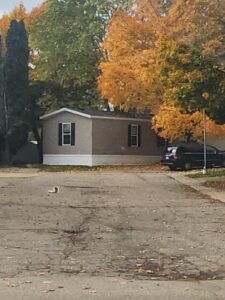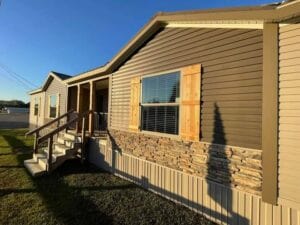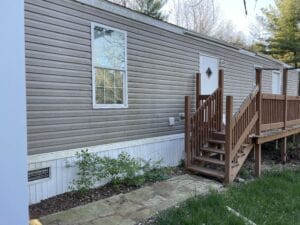Did you know that mobile homes are revolutionizing the housing industry in America? These affordable and versatile dwellings have been gaining immense popularity, meeting the growing demand for accessible housing options. With a rich history dating back decades, mobile homes have become an integral part of American culture.

Mobile Homes in America United States US
Mobile homes offer a unique solution to the housing crisis, providing comfortable living spaces at a fraction of the cost compared to traditional houses. They have evolved from humble beginnings into stylish and modern residences that cater to diverse needs. Today, more people than ever are turning to mobile homes as an affordable alternative.
The surge in demand for mobile homes reflects their practicality and affordability. As the housing market becomes increasingly competitive, these portable dwellings offer flexibility and freedom without compromising on quality. From young professionals seeking independence to retirees looking for simplicity, mobile homes provide a convenient and cost-effective lifestyle option.
We’ll delve into their history, examine their importance as affordable housing solutions, and uncover why they continue to gain popularity across the nation. So buckle up and join us on this journey through Mobile Homes America!
Exploring the Popularity of Mobile Homes in America
Rise in homeownership rates through mobile homes
Mobile homes have revolutionized the way Americans approach homeownership. In recent years, there has been a significant rise in the number of individuals and families choosing mobile homes as their primary residence. This surge can be attributed to several factors that make mobile homes an appealing option for prospective homeowners.
One of the key reasons behind the increasing popularity of mobile homes is their affordability. Traditional housing options often come with exorbitant price tags, making it difficult for many Americans to achieve their dream of owning a home. Mobile homes, on the other hand, offer a more budget-friendly alternative. With lower purchase costs and flexible financing options, they provide an accessible path to homeownership.
Benefits of living in a mobile home community
Living in a mobile home community brings numerous advantages that attract individuals from various demographics. These communities foster a sense of belonging and camaraderie among residents. Unlike traditional neighborhoods where neighbors may rarely interact, mobile home communities encourage social connections through shared amenities such as recreational areas, swimming pools, and communal spaces.
Maintenance responsibilities are often shared within these communities, alleviating some of the burdens associated with owning a standalone house. Common areas are typically well-maintained by management teams or resident associations, allowing homeowners to focus on enjoying their surroundings rather than spending excessive time on upkeep

Increasing interest from millennials and retirees in mobile homes
Mobile homes have gained traction not only among retirees seeking affordable retirement options but also among millennials looking for an entry point into the housing market. For retirees, downsizing to a smaller space offers financial freedom and reduces maintenance demands. The ability to live comfortably while stretching retirement savings is particularly attractive.
Meanwhile, millennials are drawn to mobile homes due to their flexibility and cost-effectiveness. Many young adults prioritize experiences over material possessions; therefore, investing in a traditional home may not align with their values. Mobile homes provide an affordable way for millennials to establish a home base while maintaining the freedom to travel and explore different locations.
Economic factors: Mobile Homes in America United States US
Several economic factors have contributed to the surging popularity of mobile homes in America. One notable factor is the increasing cost of traditional housing, which has outpaced wage growth in many areas. As a result, more individuals are turning to mobile homes as a viable alternative that offers homeownership without breaking the bank.
Furthermore, the ability to search for mobile homes online has made it easier than ever for potential buyers to find suitable options. Online platforms allow individuals to browse through a wide range of listings, compare prices, and connect with sellers directly. This convenience has significantly streamlined the process of purchasing a mobile home, attracting even more people to consider this housing option.
Understanding the Different Types of Mobile Homes
Single-Wide, Double-Wide, and Triple-Wide Homes
Mobile homes come in various sizes and configurations to suit different needs. One of the key distinctions is between single-wide, double-wide, and triple-wide homes.
Single-wide mobile homes are typically narrower and more compact than their counterparts. They are usually around 14 to 18 feet wide and up to 80 feet long. These homes are a popular choice for individuals or small families looking for affordable housing options.
On the other hand, double-wide mobile homes offer more space and comfort. As the name suggests, they consist of two separate units that are joined together on-site to create a wider living space. With widths ranging from 20 to 32 feet, these homes provide ample room for larger families or those who desire extra space.
Triple-wide mobile homes take it a step further by offering even more square footage. These spacious dwellings are made up of three separate units that are assembled on-site. With widths exceeding 45 feet, these homes provide an expansive living area suitable for large families or individuals looking for maximum comfort.
Manufactured vs Modular Homes: Mobile Homes in America United States US
There are two main categories: manufactured and modular homes. While both types share similarities in terms of mobility and affordability, they have distinct features that set them apart.
Manufactured homes are built entirely off-site in a factory setting before being transported to their final location. They adhere to strict construction standards imposed by the Department of Housing and Urban Development (HUD). These homes offer a wide range of customization options such as floor plans, finishes, fixtures, and appliances.
Modular homes also undergo factory construction but differ from manufactured ones in their building codes compliance. Modular homes adhere to local building codes rather than HUD regulations since they are intended for permanent placement on private property. Like manufactured homes, modular units can be customized to suit individual preferences.
Customization Options: Mobile Homes in America United States US
One of the advantages of mobile homes is the ability to personalize them according to specific needs and preferences. Different types of mobile homes offer varying degrees of customization options, allowing homeowners to create a space that truly reflects their style and requirements.
For single-wide, double-wide, and triple-wide homes, customization options include:
-
Choice of floor plans: Select from a variety of layouts that optimize space utilization and cater to specific room requirements.
-
Interior finishes: Customize the interior with different flooring materials, wall colors, cabinetry styles, and countertop materials.
-
Fixtures and appliances: Choose from various options for lighting fixtures, bathroom fixtures, kitchen appliances, HVAC systems, etc.
-
Exterior features: Personalize the exterior with siding materials, roofing styles/colors, window designs, porch additions, etc.
Choosing Between New or Used Units
When considering a mobile home purchase, one important decision is whether to opt for a new or used unit. Each option has its own set of pros and cons that should be carefully evaluated before making a choice.
New mobile homes offer several advantages such as:
-
Warranty coverage: New units often come with warranties that provide protection against manufacturing defects or structural issues.
-
Customization opportunities: Purchasing a new unit allows for greater flexibility in selecting desired features and finishes.
Manufactured vs. Modular Homes: Key Differences
Distinctions between manufactured and modular construction processes
Manufactured homes and modular homes are two popular options for individuals looking to buy a home in America. While both types offer the convenience of factory-built construction, there are key differences in their construction processes.

Manufactured homes, also known as mobile homes, are constructed entirely in a factory setting. The entire building process takes place indoors, ensuring consistent quality control and protection from external elements during construction. These homes are built on a steel chassis with wheels attached for transportation purposes. Once completed, they are transported to the desired location.
On the other hand, modular homes are also constructed in a factory but differ from manufactured homes in that they consist of multiple modules or sections that are assembled on-site. Each module is built separately and then transported to the final location where they are joined together to form the complete home. This allows for greater flexibility in design and customization.
Building codes and regulations governing each type of home
Another important distinction between manufactured and modular homes lies in the building codes and regulations that govern their construction. Manufactured housing is subject to federal regulations set by the Department of Housing and Urban Development (HUD). These regulations ensure safety standards for manufactured homes across America.
Modular homes, however, must adhere to local building codes specific to the area where they will be placed. Since these codes can vary from state to state or even county to county, it’s essential for buyers to familiarize themselves with the specific requirements before purchasing a modular home.
Transportation and installation variations for manufactured and modular units
Transportation methods vary for manufactured and modular units due to their different construction styles. Manufactured homes, with their steel chassis and wheels, can be easily transported using specialized trailers or trucks designed specifically for this purpose. They can be relocated relatively easily if needed.
In contrast, transporting modular units requires careful planning due to their larger size and the need to transport multiple sections. These sections are typically transported using flatbed trucks or specialized carriers. Once on-site, a crane is used to lift and place each module onto a foundation or basement.
Financing options specific to manufactured or modular home purchases
Financing options for manufactured and modular homes may also differ based on their classification. Manufactured homes are often considered personal property rather than real estate, which can affect the financing options available. Buyers may choose chattel loans, which treat the home as personal property, or pursue traditional mortgage loans if the home meets certain criteria.
Modular homes, being classified as real estate, can generally be financed through traditional mortgage lenders. Buyers have the option to obtain construction-to-permanent loans that cover both the construction process and permanent financing once the home is completed.
Doublewide Homes: Spacious and Affordable Living
Doublewide homes offer a range of advantages over their single-wide counterparts, making them an excellent choice for those seeking spacious and affordable housing options. With increased square footage, cost-effectiveness, and a variety of amenities commonly found in doublewide home designs, these dwellings provide a comfortable living experience that rivals traditional site-built houses.
Advantages of Doublewide Homes over Single-Wide Models
One significant advantage of doublewide homes is the increased square footage they offer. With more space available, homeowners have the freedom to create comfortable living areas that accommodate their needs and preferences. Whether it’s a larger kitchen for family gatherings or an expansive master bedroom suite for added luxury, the additional square footage allows for greater flexibility in designing one’s dream home.
Moreover, doublewide homes are often more cost-effective compared to traditional site-built houses. These manufactured homes are typically less expensive to construct and purchase than their site-built counterparts. The affordability factor makes them an attractive option for individuals looking to own their own home without breaking the bank. Lower construction costs can translate into savings on financing options such as mortgages.
Increased Square Footage for Comfortable Living Spaces
The size of a doublewide home provides ample room for various living spaces. Homeowners can enjoy generous-sized bedrooms, multiple bathrooms, spacious kitchens with modern appliances, inviting living rooms, and even dedicated office spaces or playrooms. The extra square footage allows families to spread out comfortably and make use of every inch of their new home.
To give you an idea of the possibilities within doublewide floor plans:
Bedrooms: Typically ranging from two to four bedrooms depending on the model.
Bathrooms: Multiple bathrooms are common in doublewides; some models even feature en-suite bathrooms in the master bedroom.
Kitchen: Spacious kitchens with plenty of counter space and storage options.
Living Room: Large open-concept living areas that can accommodate furniture arrangements and entertainment setups.
Office/Playroom: Some floor plans include additional rooms that can be used as home offices or playrooms for children.
Cost-Effectiveness Compared to Traditional Site-Built Houses
Doublewide homes offer a cost-effective alternative to traditional site-built houses. The construction process of manufactured homes allows for greater efficiency, reducing labor and material costs. The controlled environment of a factory ensures consistent quality standards throughout the building process. These factors contribute to lower pricing compared to site-built houses, making doublewide homes an affordable option for those in search of their dream home.

Amenities Commonly Found in Doublewide Home Designs
Doublewide homes often come equipped with a variety of amenities that enhance the overall living experience. These amenities can include:
Energy-efficient appliances: Modern doublewides frequently feature energy-saving appliances, helping homeowners reduce utility costs while minimizing their environmental impact.
Walk-in closets: Many doublewide models offer spacious walk-in closets in bedrooms, providing ample storage space for clothing and personal belongings.
Upgraded fixtures and finishes: From stylish faucets to contemporary lighting fixtures, doublewide homes often incorporate upgraded features that add a touch of elegance to the interior design.
Open floor plans: Doublewides are known for their open-concept layouts, creating a sense of spaciousness and facilitating easy movement between rooms.
Top Mobile Home Manufacturers and Suppliers in the US
America offers a wide range of options from leading manufacturers and suppliers. Whether you’re looking for a cozy retreat or a spacious family home, these top companies have got you covered. Let’s take a closer look at the best mobile home manufacturers and suppliers in the United States.
Leading Manufacturers: Mobile Homes in America United States US
The manufacturers listed below are known for their commitment to quality and innovation:
Clayton Homes: With over 60 years of experience, Clayton Homes is one of the most reputable names in the industry. They offer an impressive selection of mobile homes with various floor plans and customization options.
Champion Homes: Known for their durable construction and energy-efficient features, Champion Homes has been setting high standards in the mobile home market for decades. Their attention to detail ensures that every home they produce is built to last.
Fleetwood Homes: Fleetwood Homes has been delivering top-notch manufactured and modular homes since 1950. They are renowned for their craftsmanship, stylish designs, and commitment to customer satisfaction.
Reputation, customer reviews, and ratings for top suppliers
To ensure your investment goes into reliable hands, it’s essential to consider supplier reputation along with manufacturer quality. The following suppliers have earned positive feedback from customers:
American Mobile Home Sales: This supplier has established itself as a trusted name in the industry by offering excellent service and a wide selection of mobile homes from various manufacturers.
Mobile Home Village: Known for its user-friendly platform, Mobile Home Village connects buyers with reputable sellers across America. It provides detailed listings along with customer reviews to help you make informed decisions.
Manufactured Housing Consultants: With an extensive network of reputable manufacturers, this supplier offers competitive pricing along with exceptional customer service throughout the buying process.
Range of floor plans, features, and customization options offered by manufacturers
Manufacturers understand that every homeowner has unique preferences and requirements. To cater to diverse needs, they provide a wide range of options:
Floor plans: From cozy single-section homes to spacious multi-section models, manufacturers offer a variety of floor plans to suit different lifestyles.
Features: Mobile homes can be equipped with modern amenities such as energy-efficient appliances, upgraded flooring, and stylish fixtures.
Customization: Many manufacturers allow buyers to customize their mobile homes by selecting paint colors, flooring materials, cabinetry styles, and more.
Availability across different regions within the United States
Mobile homes are available in various regions across the country. Whether you’re looking for a home near the coast or in the heartland, you’ll find options that suit your location preferences. Manufacturers and suppliers have distribution centers or authorized retailers throughout the United States, ensuring accessibility no matter where you choose to settle down.
Mobile Homes For Sale in America United States US: Factors to Consider When Buying
Location Considerations
One of the most crucial factors to consider is the location. Zoning laws and regulations vary from one area to another, so it’s essential to research and understand the specific requirements for mobile homes in your desired location. Some areas may have restrictions on where mobile homes can be placed or require certain permits. You should consider lot size requirements to ensure that the property can accommodate your mobile home comfortably.
Read our articles on Mobile Home Carports: Affordable & Attached
Affordability Factors
Another important aspect to consider when buying a mobile home is affordability. The purchase price of a mobile home can vary significantly depending on factors such as size, condition, amenities, and location. It’s crucial to set a budget and determine how much you are willing to spend on your new home. Explore financing options available for mobile homes, including loans specifically designed for this type of housing. Comparing different financing options will help you find the best terms that suit your financial situation.
Inspection Process: Mobile Homes in America United States US
Before finalizing any purchase, it is vital to conduct a thorough inspection of the mobile home. This step ensures that quality standards are met and helps identify any potential issues or defects that may require repairs or renovations. Engaging a professional inspector who specializes in mobile homes can provide valuable insights into the overall condition of the property. They will assess structural integrity, plumbing systems, electrical wiring, roofing conditions, and other critical aspects.
During the inspection process:
Check for signs of water damage or leaks.
Inspect all appliances and fixtures.
Examine flooring and walls for any damages.
Test all electrical outlets and switches.
Assess the heating and cooling systems.
Resale Value and Potential Appreciation
While considering buying a mobile home in America United States US, it’s essential to think about its future resale value and potential appreciation over time. Although traditional homes generally appreciate in value, mobile homes tend to depreciate. However, this doesn’t mean they cannot be a worthwhile investment. Factors such as location, market demand, and overall quality can influence the resale value and appreciation potential of a mobile home.
To maximize the resale value and potential appreciation:
Choose a desirable location.
Maintain the mobile home properly.
Make upgrades or renovations when necessary.
Mobile Homes in America United States US: Embracing the American Lifestyle
In conclusion, mobile homes have become a popular choice for embracing the American lifestyle. These affordable and versatile housing options offer a range of benefits that appeal to individuals and families across the country.
Throughout this article, we explored the reasons behind the popularity of mobile homes in America. We discussed the different types of mobile homes available, including manufactured and modular homes, highlighting their key differences. We delved into the advantages of doublewide homes, which provide spacious living at an affordable price point.
To help you navigate the world of mobile homes, we also provided information on some of the top manufacturers and suppliers in the US. This ensures that you can make an informed decision when purchasing your own mobile home.
When buying a mobile home, it’s essential to consider various factors such as location, amenities, and financing options. By taking these aspects into account, you can find a mobile home that suits your needs and preferences perfectly.
In summary, embracing the American lifestyle with a mobile home offers affordability, flexibility, and comfort. Whether you’re looking for a permanent residence or a vacation getaway, these housing options provide an excellent solution for individuals seeking to enjoy all that America has to offer.
So why wait? Start exploring your options today and find your dream mobile home that fits your budget and lifestyle!
If you are looking for mobile homes in the United States visit: www.USMobileHomePros.com
Mobile Homes in America United States US: FAQs
Q: Can I finance a mobile home purchase?
A: Yes! Many financial institutions offer loans specifically tailored for purchasing mobile homes. It’s advisable to research different lenders and compare their terms to secure favorable financing options.
Q: Are there any restrictions on where I can place my mobile home?
A: Yes, placement regulations vary depending on local zoning laws and community guidelines. It’s crucial to check with local authorities or consult with professionals in the industry to ensure compliance before selecting a location for your mobile home.
Q: How long do mobile homes typically last in the US?
A: With proper maintenance and care, mobile homes can last for several decades. Regular inspections, repairs, and upkeep are essential to prolong the lifespan of your mobile home.
Q: Can I customize my mobile home in the United States?
A: Absolutely! Mobile homes offer a range of customization options, allowing you to personalize your living space according to your preferences. From interior finishes to exterior features, you can tailor your mobile home to reflect your unique style.
Q: Are mobile homes energy-efficient?
A: Yes, modern mobile homes are designed with energy efficiency in mind. They often include features such as insulation, high-quality windows, and energy-efficient appliances that help reduce utility costs and minimize environmental impact.
Q: Can I move my mobile home if needed in the US America?
A: Yes, one of the advantages of owning a mobile home is its mobility. While it requires proper planning and permits, you have the flexibility to relocate your mobile home if necessary.
Q: What are some additional costs associated with owning a mobile home?
A: In addition to the purchase price of the mobile home itself, other costs may include land rental fees (if applicable), utilities, insurance premiums, property taxes (if applicable), and ongoing maintenance expenses.
Q: Do I need insurance for my mobile home in the US America United States?
A: It’s highly recommended to have insurance coverage for your mobile home. Mobile home insurance provides protection against potential risks such as natural disasters or accidents that could cause damage or loss to your property.
Q: Can I rent out my mobile home when not in use?
A: Renting out a vacant mobile home is possible in certain cases; however, it depends on local regulations and any restrictions imposed by the community or park where the home is located. Always check with relevant authorities before considering renting out your mobile home.
You might also be interested in our articles:
Why Mobile Home Inspections Are Vital
